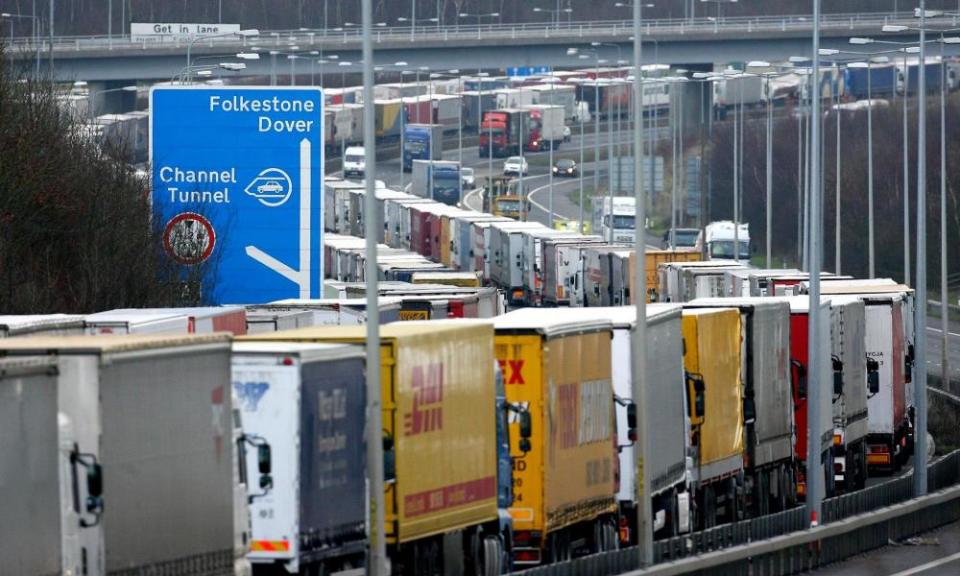No-deal Brexit would trigger wave of red tape for UK drivers and hauliers

British drivers may need new licences and registration certificates to travel in Europe after Brexit under contingency plans being drawn up by the government that experts warn would create “extremely labour-intensive” extra red tape.
In the first of a series of steps to deal with the possibility of failing to reach a deal with the EU, the UK is signing up to a United Nations convention on road traffic, which theoretically also affects zebra crossings and parking.
The 1968 Vienna convention, which Britain previously avoided joining because it was too burdensome, has become an urgent necessity because the EU will no longer recognise UK-issued licences after Brexit and could ban all drivers and vehicles without an alternative agreement.
Though the UK still hopes for a “deep and special” trade deal to replace existing EU rules after a transition period, it has just a few days left to ratify the UN convention in time before the planned final departure next March.
After a 21-day scrutiny period in parliament and up to a year to pass enabling legislation, the convention requires the setting up of a new system for registration of trailers and the issuing of international driving permits (IDPs) if the EU refuses to recognise UK licences.
Insiders say the prospect of triggering this wave of extra red tape had led to furious rows within Whitehall but the lack of alternatives has forced proposed legislation – the haulage permits and trailer registration bill – to be rushed into the Lords.
“There will be some costs in relation to the provision of a new system for issuing 1968 convention compliant IDPs, and the provision of a registration system for trailers travelling overseas,” said an accompanying government memo published on Wednesday.
Officials have insisted that it was not the government’s intention for UK drivers to need IDPs in Europe, but in an EU notice issued last month, the European commission said: “A driving licence issued by the United Kingdom will no longer be recognised by the member states.”
Without a recognised licence, travellers to Europe could find themselves unable to hire cars or take insurance, as has happened in some US states such as Florida, although some countries may choose not to enforce the convention.
The paper-based IDP can currently be obtained from a limited number of post offices as well as the AA and RAC for a charge of £5.50 and after tackling various bureaucratic hurdles.
“It’s extremely labour-intensive,” said AA spokesman, Ian Crowder. “It’s certainly a possibility that an IDP will be required in Europe, although we think it’s unlikely because we hope they will reach a deal.”
The Vienna convention requires drivers of certain trailers to seek a separate vehicle registration when travelling abroad. The government has said this will be mandatory for commercial drivers and larger non-commercial drivers, and voluntary for smaller caravans and horse boxes.
“The extra time and hassle if you have a fleet of several thousand trailers would be tremendous,” said James Hookham, the deputy chief executive of the Freight Transport Association.
The Vienna convention also contains measures that the UK hopes to seek an exemption from. These require different rules for pedestrian crossings, for drivers on different sides of the road to park in the same direction, and for lights to be used when parking, going through tunnels or carrying loads. The government’s intention “to enter reservations” against these rules could be challenged by other countries.
But the biggest long-term challenge for the UK freight industry is the tiny number of travel permits potentially available for British truck drivers if there is no other solution found through an EU trade deal.
Under existing international treaties there are between 103 and 1,224 permits a year available to deal with more than 300,000 journeys by 75,000 British trucks.
“British businesses have heard enough talking – what’s needed now is a concrete solution to enable all those involved in moving goods and services across the UK’s borders to plan with certainty for a post-Brexit future,” said Hookham. “The time for discussions is over – what the country’s businesses need now is action, to keep trading Britain trading without penalty or hindrance.”
Legislation to run a rationing scheme for the tiny number of permits is part of the new bill introduced into the Lords on Wednesday, but the government insists it is only a precaution.
The transport secretary, Chris Grayling, said: “We believe reaching an agreement to continue the liberal access enjoyed by both sides is in everyone’s interests and remain confident we will do so.
“But I also understand that hauliers are planning for the years ahead and want to have certainty that any future deal can be implemented smoothly – so this bill ensures we have plans in place if the deal requires a permitting system.”

 Yahoo Finance
Yahoo Finance 